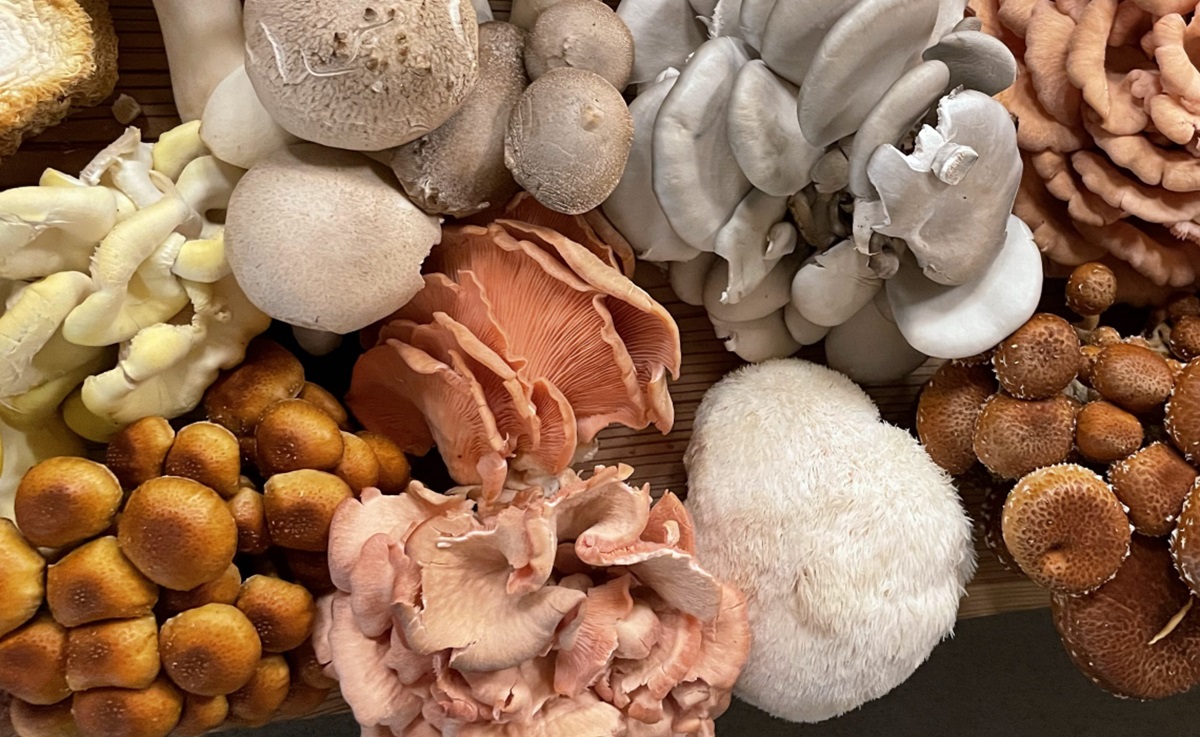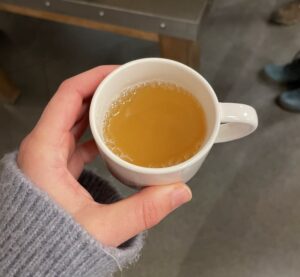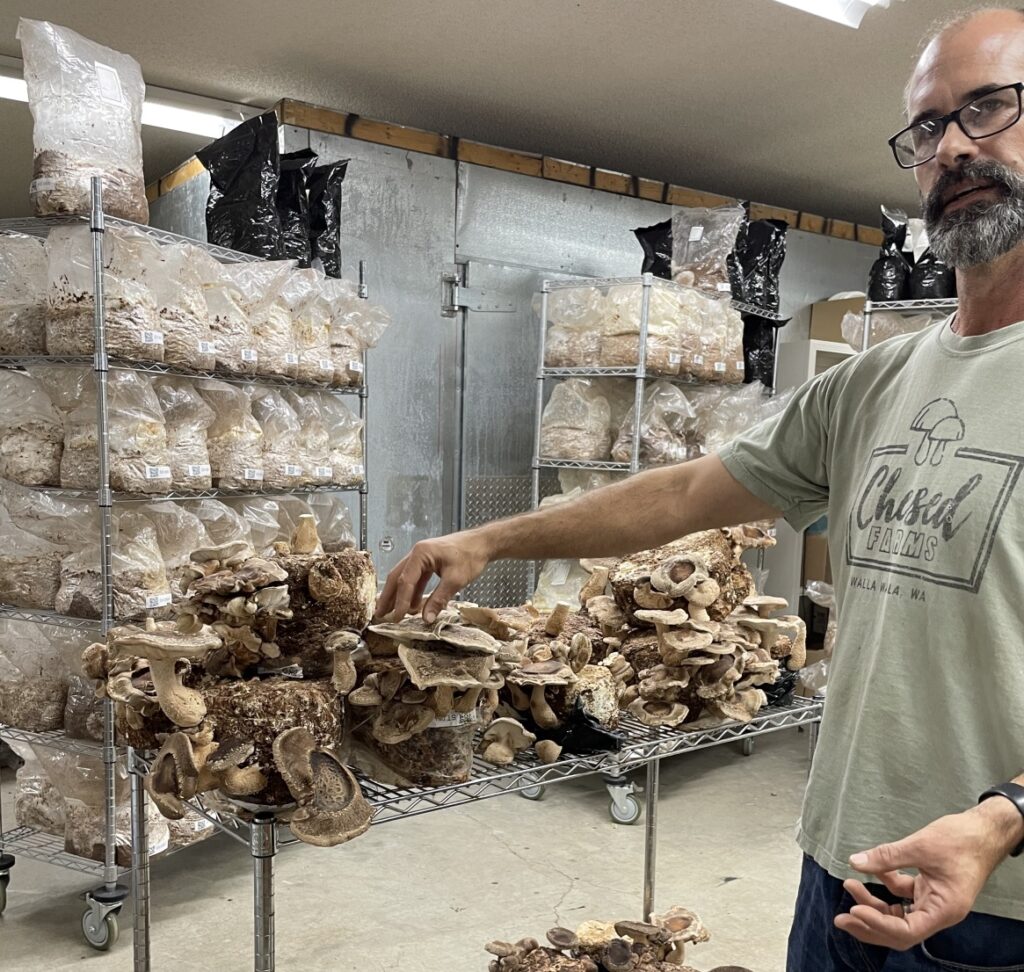So Mush Room in Our Hearts (for ‘Shrooms)

Beautiful mushrooms on display at a Mycology Club meeting at Whitman College.
Mushrooms are having a moment. With a rise in mushroom-themed art, beauty, fashion, film, and culinary and wellness explorations, mushrooms’ popularity has risen exponentially in recent years. The New York Times even named them the food ingredient of the year recently. The collective fondness for ‘shrooms includes many enthusiasts on the college campuses we serve.
In my past year and a half as the Bon Appétit Management Company’s West Coast fellow, working with student groups dedicated to mycology (the scientific study of fungi) has given me an opportunity to host events focused on growing, foraging, cooking, and eating mushrooms. Our teams rely on mushrooms for plant-based alternatives to meat, or to be blended with ground beef for burgers or meatballs to help reduce beef portions (and by extension, carbon emissions).
On a recent visit to Lewis and Clark College, I partnered with their Mycology Club for a mushroom-themed cooking demonstration. Executive Chef James Moody walked approximately 15 students and their faculty advisor through how to make tempura king trumpet mushroom bao buns. King trumpet mushrooms are perfect for this recipe, we learned, because they don’t retain much water and take on flavor very well. Chef James showed us how to marinate the mushrooms in soy sauce, mirin, and sake and then sauté the mixture to reduce the sauce. We moved back into the kitchen to dredge the marinated mushrooms in flour and batter, then deep fry them.
The baos were assembled with bright orange shaved carrots, scallions, bok choy, cilantro, spicy plant-based aioli, and the fried mushrooms. General Manager Ryan Jensen also attended and offered some wonderful insights as an avid mushroom forager. Our mushroom-centric chat covered other ways we like to cook our favorite fungi (wild mushroom risotto, chanterelles with a fried egg on top, or chanterelles cooked in butter to freeze for future use), where to forage or buy mushrooms locally (the Mycology Club emphasizes safety when foraging, since picking the wrong ‘shroom can be deadly), and other general cooking tips (Swiss peelers are the best for thinly shaving vegetables).

Lion’s mane tea with honey and mint.
The Northwest is known for its wild mushrooms, and Lewis and Clark students aren’t the only ones fascinated by fungi. When I visited Whitman College last year, I joined the Whitman Mycology Club for a cooking demonstration. Culinary Director Jon Sodini made seared king oyster mushrooms on top of a salad, pickled oyster mushrooms on top of sushi rice, mushroom ragu with crème fraîche on bread, and lion’s mane tea with mint and honey. All the food was delicious, and Chef Jon brought his own insights as an experienced forager to the cooking demo. Farm to Fork Vendor Frog Hollow Farms attended the event and supplied the vegetables. The mushrooms were supplied by a local mushroom farm, Chesed Farms, and various members of their team also came to the event.
Getting Into the Field
To build on my work with the Mycology Club at Whitman and Chesed Farms, this fall I organized a field trip for three students from the group to learn about Chesed Farms’ operations. The Mycology Club is looking to start growing their own mushrooms this year, so we gained a lot of insight from this visit. The owner, Sundown Hazen, explained to us the process of mixing their substrate made of wood and grain to then inoculate with mycelium to grow a variety of mushrooms, and then walked us through the different stages of growth.
We learned some fun mushroom facts, too. Did you know that Pennsylvania is the capital of button mushroom cultivation? Also, since shiitake mushrooms grow out of decaying tree logs in the wild, the Chesed growers explained how they slap the bags of shiitake mushrooms to simulate a tree falling and mimic similar growing conditions. We also learned that mushrooms can grow an astonishing 50% larger each day in their grow bags as they stretch in search of oxygen (unlike plants, whose growth is stimulated by the search for light).
Chesed Farms started in 2020 to fill the market gap in Walla Walla for local mushrooms. It’s expanded since then, selling mushrooms to restaurants and grocery stores, along with Bon Appétit. We toured their new space down the road, where they are expanding operations to grow microgreens and even more mushrooms. (Their radish microgreens are already being used in the sushi in the café!)
Mushrooms are a fantastic topic for our students and teams to explore from a culinary, art, science, or agricultural perspective. The fungi kingdom is vast, and it is wonderful to find ways to take advantage of the growing interest in mushrooms and collaborate to learn more about this fascinating ingredient.

Sundown Hazen of Chesed Farms in Walla Walla, WA explains the process for growing shiitake mushrooms during a Whitman College field trip.